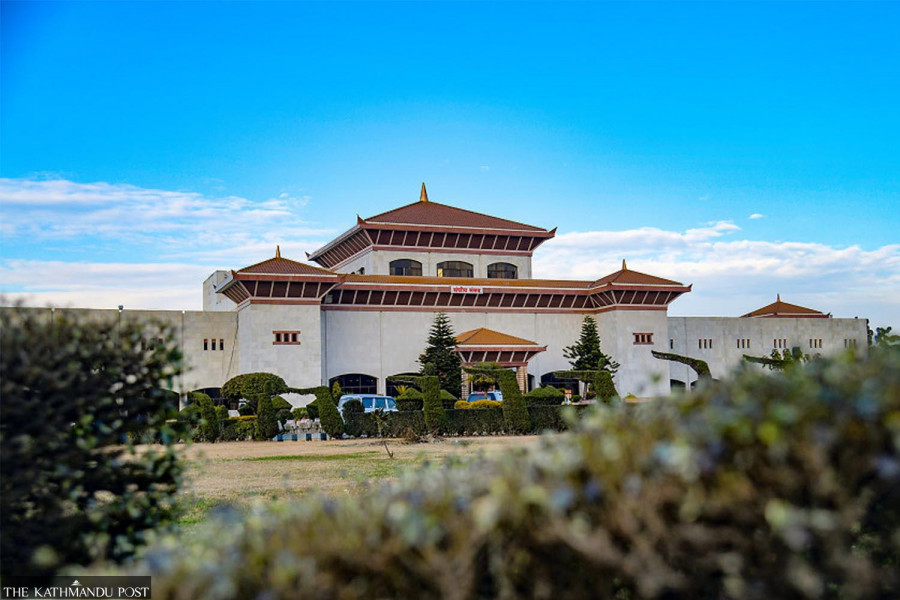
There is no option but to suspend the 15-day provision for discussion, official says. Post File Photo
The government must present the fiscal budget for 2022-23 in the House of Representatives on May 29, as per the constitution. But before that, it needs to present its policies and programmes. At least 15 days prior to the budget presentation, pre-budget discussions need to be held. The House, however, is currently in recess.
With the election fever gripping the country—local elections are scheduled for May 13—there is no certainty about when the budget session will commence.
On Sunday, House Speaker Agni Sapkota met with Prime Minister Sher Bahadur Deuba to discuss the dates for the budget session.
“During the meeting, the Speaker suggested calling the House session immediately after the elections. However, there is no information about the date yet,” Gopal Nath Yogi, secretary at the House of Representatives, told the Post. “It will be difficult to schedule pre-budget discussions, and presentation of and discussions on the government policies and programmes if the parliament session is not started by May 17.”
May 13 is a holiday for voting and May 14 is Saturday. The government has decided to implement a two-day weekend policy starting May 15. And May 16 is Buddha Jayanti. That leaves May 17 as the earliest date for calling the budget session as it is unlikely to be summoned before elections.
A provision in the Regulations of the House of Representatives says pre-budget discussions must be held 15 days prior to the presentation of the national budget. Even if the session is called on May 17, the pre-budget discussion cannot be held as per the regulations.
“There is no option but to suspend the 15-day provision,” said Yogi.
Though there is no legal and constitutional deadline for presenting the government policies and programmes, as per the practice, it is presented two weeks before the national budget.
The President reads out the government’s policies and programmes before the joint session of the House of Representatives and National Assembly.
And here is a catch.
When the last session was prorogued, the CPN-UML was in protest and obstructing the House proceedings. The UML has not been letting the House function since September, a month after Nepali Congress President Sher Bahadur Deuba was appointed prime minister, replacing UML chair KP Sharma Oli.
The UML has been protesting against Speaker Sapkota’s refusal to remove 14 of its lawmakers who later formed the CPN (Unified Socialist).
Article 95 of the constitution says the President addresses the first session after election to the House of Representatives and a joint sitting of both Houses of the federal parliament after the commencement of the first session of each year. The policies and programmes are presented in the joint sitting of the House of Representatives and the National Assembly.
The UML has vowed on many occasions to continue its obstructions unless its demands are addressed. Some wonder if the UML will continue to protest when the President presents the policies and programmes.
Though the presidency is a non-partisan constitutional position, the current Head of State Bidya Devi Bhandari in the past has been accused of working at the behest of the UML, or its chairman Oli. Bhandari was a UML vice-chairperson before she was appointed President in October 2015.
Though it’s highly unlikely that the President will not present government policies and programmes, sources said some concerns to that effect were expressed by the prime minister, given the UML’s threat to continue its protests.
“I have heard that the prime minister had expressed his concerns as to what will happen if the President refuses to attend the House because of [UML’s] obstructions,” said a senior official at the Parliament Secretariat on condition of anonymity. “However, we don’t think the President will take such a decision of not attending the session, as it is the President who summons the House. Anyway, attending the House session is the President’s constitutional duty.”
The President on the recommendation of the government summons the House sessions.
Officials at the Parliament Secretariat say the UML’s obstruction, however, will affect discussions. The policies and programmes, national budget and the pre-budget discussions are subject to deliberations in the House. Lawmakers can even present their queries during discussions and the prime minister and the relevant ministers must respond.
Parliament has remained largely ineffective since September 8 last year after the UML resorted to obstructions.
The UML on August 17 had recommended that Speaker Sapkota expel 14 of its lawmakers, including Madhav Kumar Nepal. Sapkota, however, took no action. And on August 29, Sapkota said it was not necessary to take action against them as they had already formed a new party—CPN (Unified Socialist).
Dissatisfied with Sapkota’s inaction, the UML has been disrupting all the House meetings. The party has also been demanding that the 14 lawmakers either be sacked or Sapkota resign as its precondition to lifting the obstructions.
“We have not participated in any parliamentary proceedings since September 8 last year. The obstruction will continue until our demands are met,” Bishal Bhattarai, a chief whip of the UML, told the Post. “So far, there has been no progress to this effect.”













